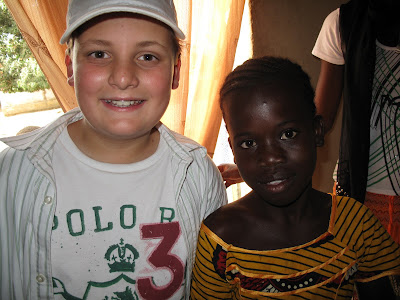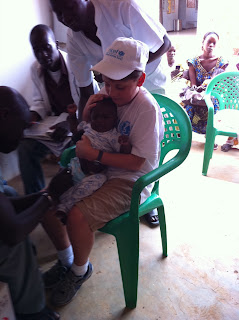I think it's great that Tostan and it's work are in the news because I saw how great they are.
5000 Villages in Senegal have renounced FGC because of Tostan....Now Gambia is joining too.
 |
| We saw this woman teach her village about not judging people by their skin color, religion or beliefs. Tostan gave them these cards to help. |
117 Fula and Mandinka communities in the Upper River Region of The Gambia publicly declared abandonment of the traditional practices of FGC and child/forced marriage. Tostan, the leading NGO in the region dedicated to women’s health and empowerment, organized the declaration ceremony, which took place earlier in June.Though neither practice is punishable under Gambian law, they have been declared violations of the Universal Declaration of Human Rights and the Rights of the Child, which The Gambia has signed.FGC exists in various forms throughout, all in some manner cutting parts of the outer female genitalia. The practice has been traditionally completed in a communal ceremony, often with re-use of the same blade for multiple girls and without anesthetics. Many health complications and even deaths have occurred as a result of the practice, which had previously been endured by almost all Gambian women. Recent studies have concluded that the percent has dropped to between 65-75%, thanks to the work of Tostan and other human rights organizations. Forced and/or child marriage is also a common traditional practice, often resulting in physical harm due to early sexual activity and pregnancy.Tostan, which means “breakthrough” or “spreading and sharing” in the West African language Wolof, have worked in the region since 2006, engaging communities in various health, hygiene, and community sustainability trainings.Alhaji AF Jallow, a member of the steering committee, spoke at the ceremony and expressed his gratitude towards Tostan, but also emphasized the importance of communities maintaining their agreement to abandon the practices. Let us all hope that this is not merely a front for the media and that genuine deep-rooted and sustained change will be occurring.
Gambia is a country within Senegal. Long story, but what you need to know is England got Gambia and France got the rest of Senegal.
See ya later! Off to the Jardin D'acclimitation in Paris.








































 We met this morning at 8:30 to get a briefing on the state of education in Senegal and what to expect today.
We met this morning at 8:30 to get a briefing on the state of education in Senegal and what to expect today.






